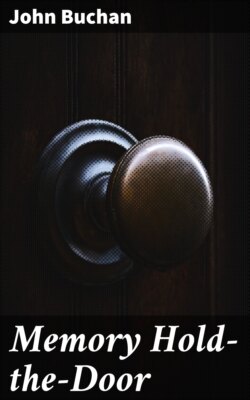Читать книгу Memory Hold-the-Door - John Buchan - Страница 10
На сайте Литреса книга снята с продажи.
I
ОглавлениеTable of Contents
I never went to school in the conventional sense, for a boarding school was beyond the narrow means of my family. But I had many academies. The first was a dame’s school, where I learned to knit, and was expelled for upsetting a broth pot on the kitchen fire. The next was a board school in the same Fife village. Then came the burgh school of the neighbouring town, which meant a daily tramp of six miles. There followed the high school of the same town, a famous institution in which I believe Thomas Carlyle once taught. When we migrated to Glasgow I attended for several years an ancient grammar school on the south side of the river, from which, at the age of seventeen I passed to Glasgow University.
Had I gone to a public school I might have developed into a useful wing three-quarter in the rugby game. Otherwise I do not think I missed much. I and my brothers were, I fear, incapable of what is called the public-school spirit. While devotees of the open air we lacked interest in games, and had few of the usual boyish ambitions. We had no wish to run with the pack, for we were absorbed in our private concerns. School to me was therefore only a minor episode. The atmosphere I lived in was always that of my home. I never felt the shyness and repression of the small boy which I have read of in school stories. At my various schools I had my ups and downs, but they mattered little and were forgotten in an hour. My interest in the world at large was not checked by any artificial conventions, and, though I was afraid of many things, I had none of the social fears and resentments of the traditional schoolboy.
Yet, looking back, I seem to have enjoyed my schools enormously. There I mixed on terms of comradeship and utter equality with children from every kind of queer environment. At my village school my chief friend was the son of a notorious local ne’er-do-well, and the two of us captained a gang of barefooted ragamuffins who waged ceaseless war against the local “gentry,” the sons of well-to-do manufacturers. With one especially, who seemed to us gigantic in height and ferocious in temper, we avoided close combat and engaged him at a distance with bows and arrows. I did not meet my antagonist again until one day in 1916 during the battle of the Somme—he was then a major-general and is now a peer—when I found him of modest stature and exceeding affability.
My lack of the usual code had one serious drawback. Youthful high spirits had to be worked off somehow, and adventures—often unjustifiable adventures—took the place of games. As a family we were too easily “dared,” as the phrase went, to attempt things dangerous or ridiculous. We were of Walter Bagehot’s opinion that the greatest pleasure in life is doing what people say you cannot do, and the consequence was that we were an anxiety to our parents, and often, owing to bodily damage, an affliction to ourselves. At my later schools this foolishness abated and I fell more into the normal habits of youth, but even then school played but a small part in my life. It was an incident, an inconsiderable incident; a period of enforced repression which ended daily at four in the afternoon.
